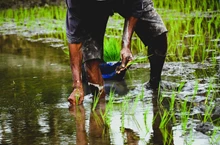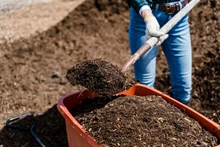
Researchers at the Leverhulme Centre for Climate Change Mitigation at the University of Sheffield recently published a ground-breaking study that highlights the immense potential of using crushed rock to combat climate change and improve crop yields. The four-year field trial, conducted in the US Corn Belt, has demonstrated that the process, known as Enhanced Weathering (EW), can remove substantial amounts of atmospheric carbon dioxide (CO2) while significantly improving crop yields.
According to the study published in the journal Proceedings of the National Academy of Sciences, incorporating crushed basalt into farmland through Enhanced Weathering can remove approximately 3-4 tonnes of CO2 per hectare per year. Moreover, maize and soybean yields witnessed a remarkable increase of 12-16 per cent, underscoring the dual benefits of this innovative approach.
The findings of this study hold particular significance in the context of combating climate change, as strategies for carbon removal, like Enhanced Weathering, have been repeatedly highlighted by the Intergovernmental Panel on Climate Change (IPCC) as essential tools to mitigate the adverse impacts of climate change. With the global population continuing to rise and facing ongoing climate challenges, the increase in crop yields assumes critical importance for ensuring food security.
Enhanced Weathering involves accelerating natural weathering processes by spreading finely ground silicate rock, such as basalt, onto soil. This facilitates chemical reactions between rocks, water, and air, effectively capturing CO2 from the atmosphere. The study underscores the vast potential of utilizing millions of hectares of farmland in the US to implement Enhanced Weathering, thereby simultaneously promoting sustainable food and biofuel production while mitigating climate change.
Furthermore, the research revealed substantial co-benefits to soil health and crop production resulting from Enhanced Weathering practices. Increased nutrient availability, rising soil pH, and greater nutrient supply released as basalt minerals dissolve contribute to enhanced crop growth. Genetic analysis of crop roots grown with basalt demonstrated a reprogramming of root nutrient uptake gene networks, supporting higher yields.
Lead author of the study, Professor David Beerling, emphasized the significance of the findings, stating, "We have shown with hard-won data the carbon removal potential of enhanced weathering practices in the real world." This breakthrough not only offers a promising solution to climate change but also underscores the importance of interdisciplinary research in addressing global challenges.
Professor Noah Planavsky from Yale University’s Centre for Natural Carbon Removal highlighted the need for clear documentation of CO2 removal technologies, affirming that the study demonstrates the efficacy of Enhanced Weathering in removing carbon while benefiting farmers.
Dr Dimitar Epihov, a co-author of the study, expressed excitement about the mechanisms underlying crop yield increases, showcasing the pivotal role of cutting-edge gene sequencing technology in advancing agricultural sustainability.
The study's implications extend beyond climate change mitigation and agriculture, aligning with the University of Sheffield's commitment to finding low-carbon solutions to energy challenges and developing dynamic solutions to food security and sustainability.
The pioneering research underscores the transformative potential of Enhanced Weathering in addressing the dual challenges of climate change and food security, offering a beacon of hope for a sustainable future.
(Source: University of Sheffield)










